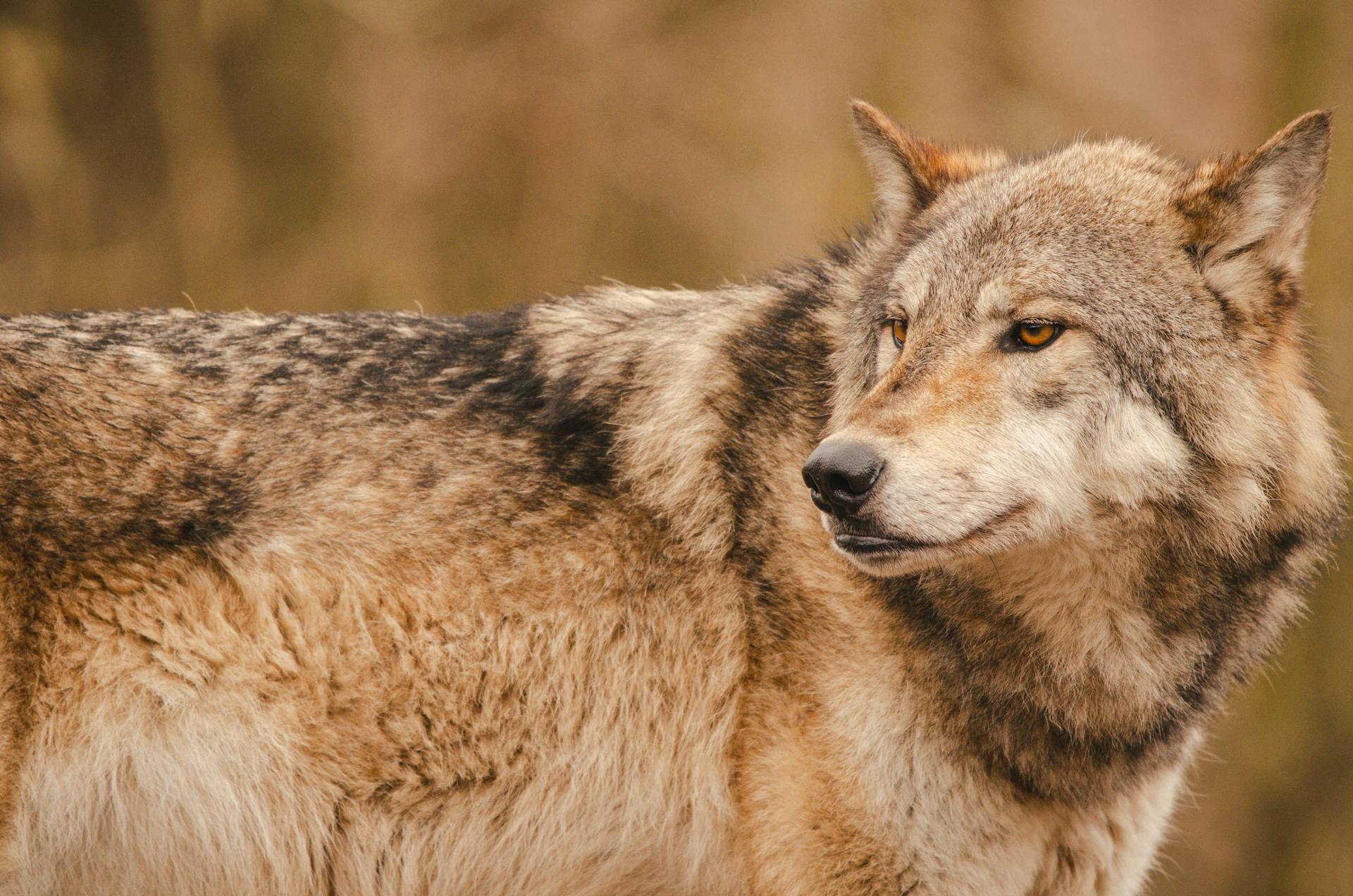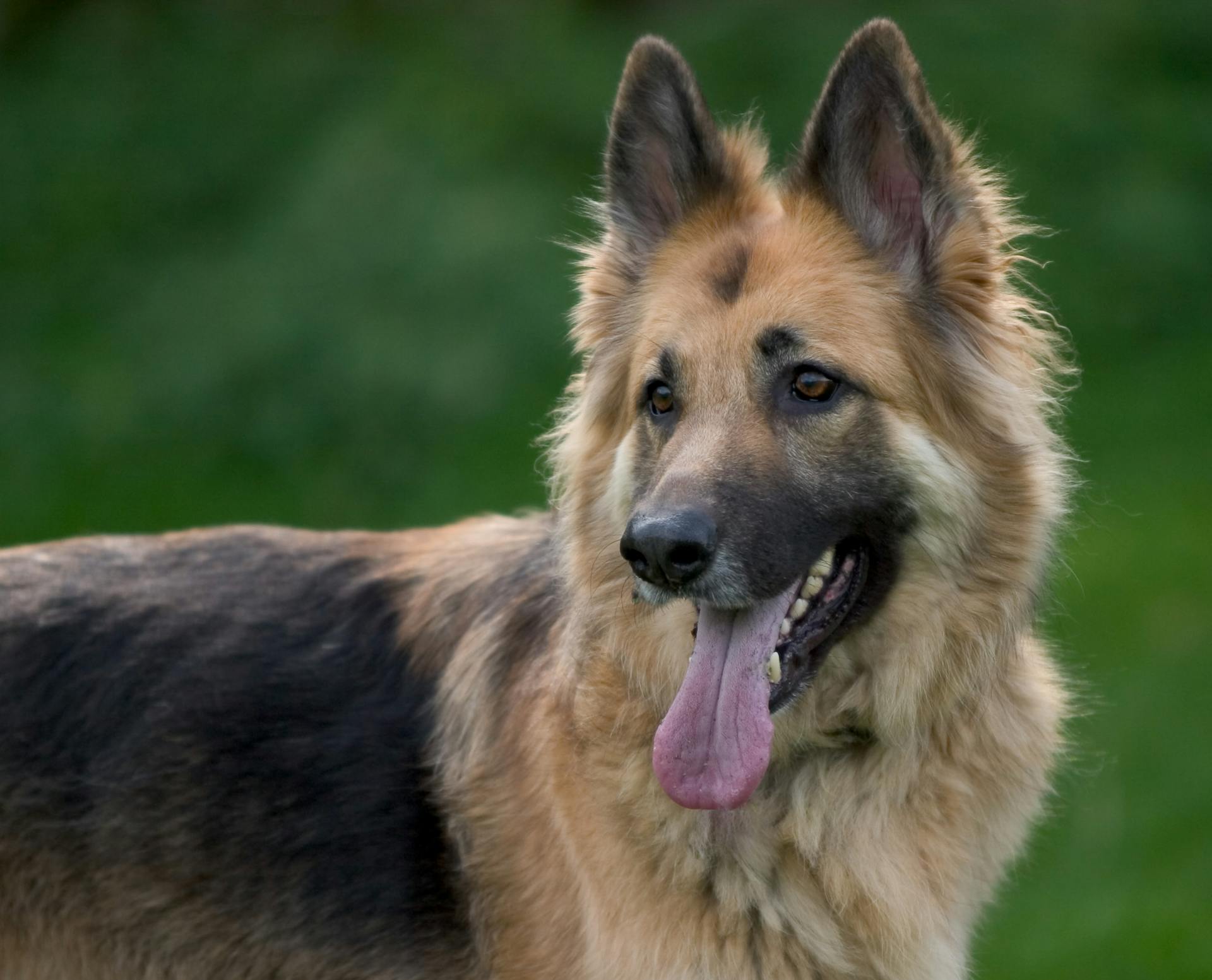
Wolf dogs are a unique and fascinating pet option, but they require a lot of attention and care. They are a cross between a domestic dog and a wolf, and their behavior and needs can be unpredictable.
Their exercise needs are high, with some wolf dogs requiring up to 4 hours of exercise per day. This is due to their wild ancestry and natural instinct to roam.
Wolf dogs are intelligent and can be trained, but they can be stubborn and independent. Consistent and positive reinforcement training is key to developing good behavior.
Their lifespan is typically 10-13 years, but with proper care and attention, some wolf dogs have been known to live up to 15 years.
What Is a Wolf Dog?
A wolf dog, also known as a wolf-dog hybrid, is an animal that's part wolf and part dog.
Their shared evolutionary past makes them very physically and behaviorally similar, allowing them to produce viable offspring when they breed.
A unique perspective: Are Siberian Huskies Related to Wolves
Wolfdogs don't have a breed standard, so breeders use the term "content" to describe the wolf-to-dog genetic ratio of a specific animal.
Low-content wolf-dog hybrids display more dog traits than wolf traits, both physically and behaviorally.
Wolfdogs are almost exclusively a result of human intervention in dog-wolf interactions, and experts say they're extremely rare in nature because wolves are territorial and monogamous.
In fact, wolves usually won't react well to dogs being near them or their territory.
Wolf Dog Breeds
Wolf Dog Breeds can be a great choice for those who want a pet with a strong connection to their wild ancestors.
Some popular wolf dog breeds include the Saarloos Wolfdog, Czechoslovakian Wolfdog, and the Canadian Wolfdog.
These breeds are often the result of cross-breeding wolves with domestic dogs, but their temperament and characteristics can vary significantly.
The Saarloos Wolfdog, for example, is known for its intelligence and loyalty, making it a popular choice for families.
If this caught your attention, see: Dog Breeds Watch Dogs
German Shepherd
The German Shepherd is a popular breed, but did you know it can be crossed with a wolf to create a hybrid? This Wolf Shepherd can reach between 50 and 100 pounds and 20 to 26 inches in height.
They have a thick coat and pointy ears, making them resemble a wolf in appearance. Their long face and large size make them a striking breed.
If socialized and trained well, Wolf Shepherds can get along with other pets in the house. However, it's still not recommended to leave them alone with smaller pets due to their prey drive.
Their curiosity is one of their defining characteristics, so a secure backyard is a must. This can be achieved by training them to curb their desire to roam when they're a puppy.
A unique perspective: German Shepherd Wolf Dogs
Siberian Husky
The Siberian Husky is a breed that's often crossed with wolves, resulting in the Siberian Husky Wolf Mix. This crossbreed is considered quite shy.
A fresh viewpoint: Are Husky Dogs Good Family Pets
They have a strong prey drive, which means they might not be the best fit for homes with small animals. This can be a problem if you have cats or other small pets.
With proper training and socialization, the Husky Wolf can make a loyal and loving pet. They thrive on attention and interaction.
Their strong pack mentality means they can be dominant over weaker dogs, so it's essential to socialize them well. This can help prevent unpredictable behavior.
The Husky Wolf is extremely intelligent, so they need plenty of exercise to stay happy and healthy. This includes both physical and mental stimulation.
Readers also liked: Service Dog Vest for Small Dogs
Great Dane
The Great Dane is a large and powerful breed, known for its majestic appearance. It's a good idea to have a lot of space for this dog, as it can grow quite big.
One thing to note about the Great Dane is that it's highly intelligent, but it can be wary of strangers. This means you'll need to be patient and gentle when introducing it to new people.
A Great Dane Wolf Hybrid is a type of dog that combines the Great Dane with a wolf, resulting in a unique and potentially challenging pet.
Alaskan Malamute
The Alaskan Malamute is a loyal and loving breed, known for being sweet and making great companions. They can be playful and energetic, but also skittish at times.
This breed can be very stubborn, which can make training challenging. Their loud bark is a distinctive trait that should be considered before bringing one home.
The Alaskan Malamute has a strong prey drive, which means they may not be the best fit for homes with small pets. Leaving them alone for too many hours can lead to destructive behavior.
A different take: Wolf Cross Breed Dog
Hybrid Breeds and Other Options
If you're considering getting a wolf-dog hybrid as a pet, you may want to research other options first. It's essential to remember that wolf-dogs can be challenging to manage due to their partially wild nature.
There are several other wolf-dog hybrids that you may have come across, including the Pitbull Wolf hybrid, Mastiff Wolf hybrid, Australian Shepherd Wolf mix, Chow Chow Wolf mix, Doberman Wolf mix, and Golden Retriever Wolf hybrid. With any of these hybrids, it's best to watch them around small pets and children.
Some wolf-dog hybrids can be quite large, such as the Mastiff Wolf hybrid, and others may have high energy levels, like the Australian Shepherd Wolf mix. It's crucial to consider these factors when deciding whether a wolf-dog hybrid is right for you.
A unique perspective: Australian Cattle Dog Herding Dogs
Labrador Retriever Mix
The Labrador Retriever mix is a fascinating option for dog owners. One example of this mix is the Labrador Retriever Wolf Dog Breed Mix, which is a cross between a wolf and a Labrador Retriever.
They require extensive training and socialization to keep as pets, but the mix is more popular than other wolf-dog hybrids.
6 Hybrid Breeds
Let's take a look at some hybrid breeds that are gaining popularity. The Labradoodle is a cross between a Labrador Retriever and a Poodle, and is often used as a guide dog due to its high intelligence and trainability.
These dogs are known for their low-shedding coat, making them a great option for people with allergies. They're also highly energetic and require regular exercise to stay happy and healthy.
The Goldendoodle is another popular hybrid breed, created by crossing a Golden Retriever with a Poodle. They're often used as therapy dogs due to their friendly and gentle nature.

Their intelligence and trainability make them a great option for first-time dog owners. They're also relatively low-maintenance when it comes to grooming.
The Cockapoo is a cross between a Cocker Spaniel and a Poodle, and is known for its affectionate and outgoing personality. They're often used as family pets due to their gentle nature.
They're also relatively small in size, making them a great option for people living in apartments or with small yards.
Broaden your view: Merrick Dog Food for Small Dogs
Other Hybrids
Other hybrids are worth mentioning, but it's essential to note that there's not as much information available about them. These hybrids can be just as challenging to manage as wolf-dog hybrids.
Some examples of other wolf-dog hybrids include Pitbull Wolf hybrid, Mastiff Wolf hybrid, Australian Shepherd Wolf mix, Chow Chow Wolf mix, Doberman Wolf mix, and Golden Retriever Wolf hybrid. These hybrids require special consideration, especially around small pets and children.
It's crucial to remember that any wolf-dog hybrid will exhibit wolf-like behavior, making them hard to manage for uninformed owners.
Dog Care
When considering wolf dogs as pets, it's essential to think about their unique needs. They require a strict diet consisting of mostly raw meat, bones, and nutritional supplements, which can cost over $5,000 a year.
Their partially-wild nature means they need a lot of space to roam and exercise. A good rule of thumb is that they resemble large dogs in size, so large enclosures are a must.
Wolf dogs are shy animals and have neophobic tendencies, meaning they'll be afraid of new experiences. This can lead to stress, which can harm them physically and mentally.
Their life expectancy is between 12 to 14 years, but poor living conditions can lead to a shorter life.
You might like: Indestructible Chew Toy for Dogs
Challenges and Considerations
Keeping a wolfdog as a pet is a serious commitment that requires careful consideration. They are difficult, expensive, and complex animals to care for.
You'll need to install an escape-proof enclosure in your home, which can be a significant investment. The enclosure should be large enough to accommodate the wolfdog's needs, and it's crucial to ensure it's secure to prevent escape attempts.
Wolfdogs require a diet that can cost over $5,000 a year, which can be a significant financial burden. This diet is essential to maintain the wolfdog's health and well-being.
In addition to the financial costs, wolfdogs also require social interaction, which means you'll need to have another similarly-sized dog to keep them company. This can be a significant commitment, especially if you have a busy schedule.
Wolfdogs can be potentially violent and aggressive, especially during "Winter Wolf Syndrome", a seasonal behavioral change that occurs once a year. During this time, they may become more territorial and aggressive.
If you live with children, it's best to reconsider getting a wolfdog as a pet. Wolfdogs are large animals that could severely harm small kids while trying to play with them.
Challenges of Keeping a Pet
Keeping a pet can be a rewarding experience, but it's essential to consider the challenges that come with it. One of the significant challenges is the financial burden, especially for exotic pets like wolfdogs. You'll need to install an expensive, large, and escape-proof enclosure in your home.
Wolfdogs require a diet that can cost over $5,000 a year, which is a significant expense for many people. This is just one of the many costs associated with owning a wolfdog.
Social interaction is crucial for wolfdogs, and they need a similarly-sized dog to keep them company. This means you'll need to have another dog in the household, which can add to the expenses and responsibilities.
Wolfdogs can be violent and aggressive creatures, especially during seasonal behavioral changes like "Winter Wolf Syndrome." This can be a significant concern for many pet owners.
If you live with children, it's essential to reconsider owning a wolfdog. These canines are large animals and could severely harm small kids while trying to play with them.
Here's a breakdown of some of the challenges you may face when keeping a wolfdog:
- Expensive enclosure: $_____
- Diet costs: $5,000/year
- Need for a companion dog: $_____
- Limitations on vacations: $_____
Note: The costs listed above are not actual prices, but rather placeholders to illustrate the expenses associated with owning a wolfdog.
Pet Ownership Laws
Owning a wolfdog comes with its own set of pet ownership laws.
You'll need to check your local laws to see if owning or buying a wolf-dog hybrid is legal where you live.
In many jurisdictions, wolfdogs are prohibited, so it's essential to do your research.
You'll need to acquire special permits to keep a wolfdog, even if it's legal in your area.
Researching local laws and regulations is crucial to ensure you're compliant.
It's not just about getting a permit, but also understanding the specific requirements for owning a wolfdog.
Curious to learn more? Check out: Wolf Dogs Legal
Frequently Asked Questions
Will a wolf dog protect you?
Wolf dogs are naturally cautious and may not instinctively defend their owners, but they will fiercely defend themselves if cornered or mistreated
Sources
Featured Images: pexels.com


